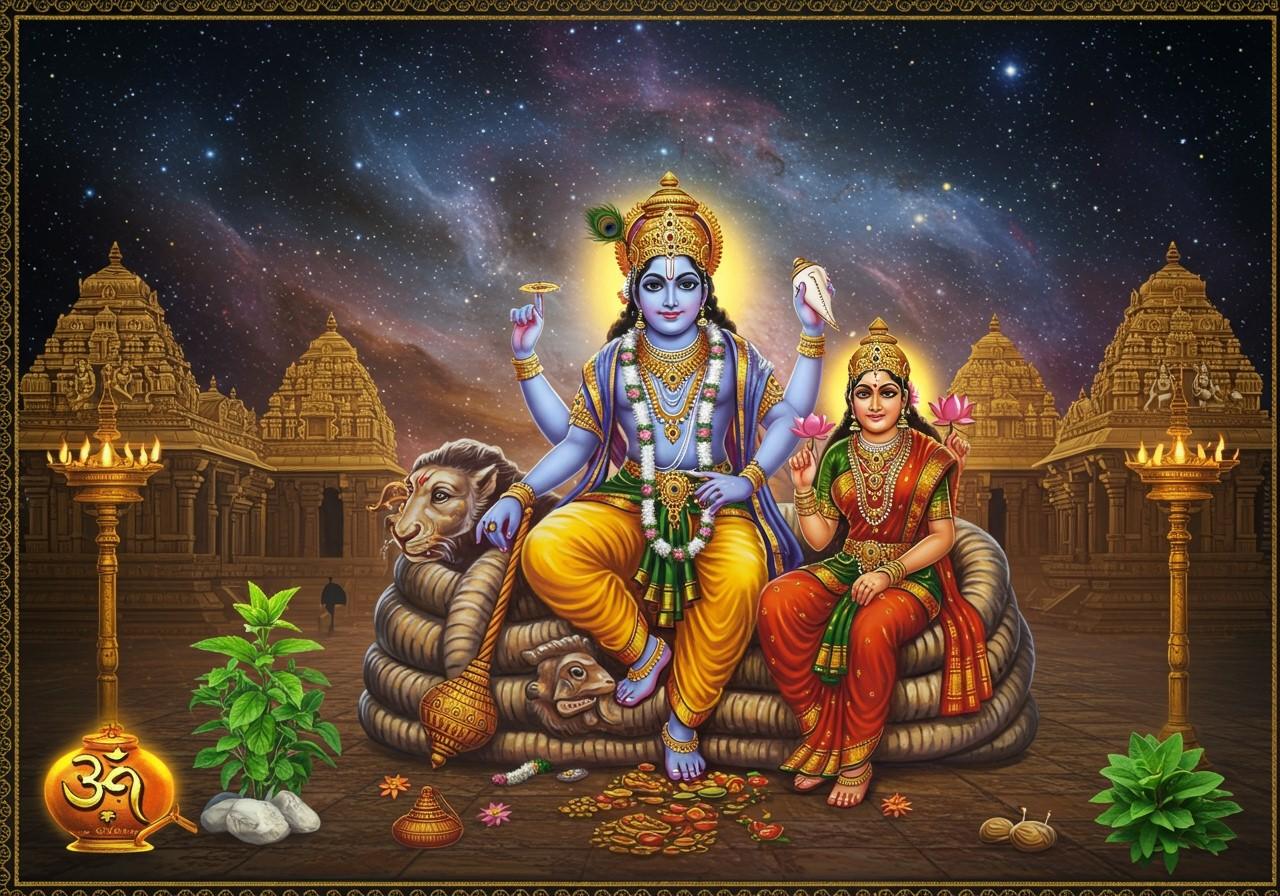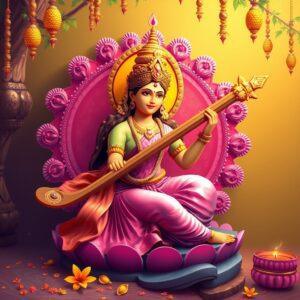
Sri Vaishnavism, a revered tradition within Hinduism, centers around the worship of Lord Vishnu and his consort, Lakshmi. This article delves into the philosophy, practices, and core beliefs of Sri Vaishnavism, offering insights into its spiritual and ritualistic aspects for those who cherish tradition.
What is Sri Vaishnavism?
Sri Vaishnavism, a major sect of Vaishnavism, emphasizes devotion to Lord Vishnu and Lakshmi. Originating in South India, it flourished through teachings of leaders like Nathamuni and Yamunacharya, drawing from scriptures like the Vedas, Upanishads, and the Divya Prabandham.
- Vaishnavism: This signifies profound devotion to Lord Vishnu, encompassing a wide range of practices and beliefs centered around him as the supreme being.
- Sri: This term reverentially refers to Lakshmi, the goddess of fortune and prosperity, and Vishnu’s consort, highlighting her significant role within the tradition.
With Vishnu and Lakshmi as central figures, Sri Vaishnavism embraces Vishishtadvaita (qualified non-dualism). This philosophy posits that while everything is connected to Brahman (Vishnu), individual souls retain their unique identity. The Alvars, saint-poets, enriched the tradition through devotional hymns. Temple worship and rituals, especially in the 108 Divya Desams (Vishnu temples), hold great importance.
Ramanuja Vaishnavism
Sri Ramanuja, a pivotal theologian of Sri Vaishnavism (circa 1017-1137 CE), reformed Vaishnavism through his profound teachings.
- Sri Bhashya: Ramanuja’s commentary on the Brahma Sutras provides deep insights into the philosophical foundations of the tradition.
- Vishishtadvaita: This philosophy, central to Ramanuja’s teachings, explains the complex relationship between the individual soul (Atman), God (Brahman), and the universe.
Ramanuja championed Bhakti (devotion) and Prapatti (surrender) as paths to liberation, advocating social inclusivity. His impact resonates in temple practices, notably in Srirangam and Tirupati.
Philosophical Foundations
Vishishtadvaita, the core philosophy of Sri Vaishnavism, emphasizes qualified non-dualism.
- Brahman: Vishnu is revered as the ultimate reality, the source and sustainer of all existence.
- Atman: The individual soul maintains a distinct relationship with Brahman, though ultimately connected.
- Karma: Actions and their consequences influence the spiritual journey, shaping one’s path towards liberation.
- Bhakti: Devotion to Vishnu is paramount, fostering a loving relationship between the devotee and the divine.
This philosophy views the world, despite its diversity, as a means for spiritual knowledge, emphasizing surrender to Vishnu for salvation.
Practices and Rituals
Sri Vaishnavas observe rituals honoring Vishnu and Lakshmi. Daily practices include chanting Vishnu Sahasranama (thousand names of Vishnu) and reciting the Divya Prabandham.
Temple visits, festivals, and guidance from Acharyas (spiritual teachers) are integral. Sacred symbols like Tilak, Tulasi (holy basil), and Shankha (conch shell) feature in rituals. Observances include Ekadashi fasting and auspicious days dedicated to Vishnu. Charity and community service are expressions of devotion.
Beliefs and Values
Sri Vaishnavas believe in Vishnu’s omnipresence and omnipotence. Ethical living (Dharma) is paramount, valuing humility, compassion, and non-violence. Life and the universe are seen as sacred manifestations of Vishnu.
Divine grace (Kripa) is essential for liberation (Moksha). Community engagement and collective spiritual pursuits are encouraged. Devotion and surrender to Vishnu lead to ultimate salvation.
How Poojn Supports Your Sri Vaishnava Practices
Poojn.in offers a wide selection of items for Sri Vaishnava rituals and daily worship. For devotees following the Vishishtadvaita philosophy, we provide:
- Sacred Symbols: Pure copper and brass Shanku (conch) and Chakra symbols for your home temple, crafted with traditional methods.
- Traditional Items: Urdhva Pundra (Namam) application sets with pure sandalwood paste and Pancha-upachara items for daily Vishnu worship.
- Devotional Accessories: Authentic Tulsi malas made from sacred wood, pure cotton Panchakacham and Uttariyam for men, and silk vastrams for deity decoration.
- Ritual Sets: Complete Saligrama puja sets and pure copper kalasha and panchapatram for your daily rituals.
Laddu Gopal, Lord Shiva Murti and Mangalam Camphor are some of the products available at poojn.in for Sri Vaishnava devotees.
Our certified authentic products meet Sri Vaishnava tradition requirements. For home temples, we offer:
- Shrine Essentials: Brass diya stands, pure silver arti plates, traditional bell sets, and essential prayer books like the Vishnu Sahasranama.
- Offerings: Pure cotton wicks and ghee for neivedyam, ensuring the sanctity of your offerings.
Visit www.poojn.in to explore our complete Sri Vaishnava collection, shipped securely across India.
Conclusion
Sri Vaishnavism, a rich tradition, fosters devotion to Vishnu and Lakshmi. Its philosophy, practices, and beliefs offer a path to spiritual growth. Ramanuja’s teachings and sacred texts guide Sri Vaishnavas. By balancing tradition and modern life, devotees honor their faith authentically. May Sri Vaishnavism’s wisdom bring peace and divine grace.
FAQs About Sri Vaishnavism
What is Sri Vaishnavism? Sri Vaishnavism, within Hinduism, reveres Lord Vishnu as supreme, emphasizing devotion and surrender, guided by Ramanuja’s teachings.
Who is Ramanuja in Sri Vaishnavism? Ramanuja (circa 1017-1137 CE), a philosopher and theologian, founded Sri Vaishnavism, teaching bhakti (devotion) and surrender to Vishnu for salvation.
What are the key beliefs of Sri Vaishnavism? Key beliefs include Vishnu’s supremacy, prapatti (surrender), bhakti (devotion), and Vishishtadvaita (qualified non-dualism).
What are the practices in Sri Vaishnavism? Practices encompass daily worship, reciting Vishnu’s names, studying sacred texts (Vedas, Divya Prabandham), temple rituals, and ethical conduct.
What is Vishishtadvaita philosophy? Vishishtadvaita, or qualified non-dualism, posits a distinct yet interconnected relationship between the soul and God, with salvation achieved through devotion to Vishnu.
What is the importance of the Divya Prabandham in Sri Vaishnavism? The Divya Prabandham, a collection of hymns by Alvar saint-poets, is central to Sri Vaishnava worship and practices.
How do Sri Vaishnavas worship Vishnu? Sri Vaishnavas worship Vishnu through rituals like puja, chanting, offerings, temple ceremonies, with devotion and surrender as key elements.
Why is surrender (prapatti) significant in Sri Vaishnavism? Surrender (prapatti), signifying complete submission to Vishnu’s will, is believed to lead to salvation and eternal bliss.


